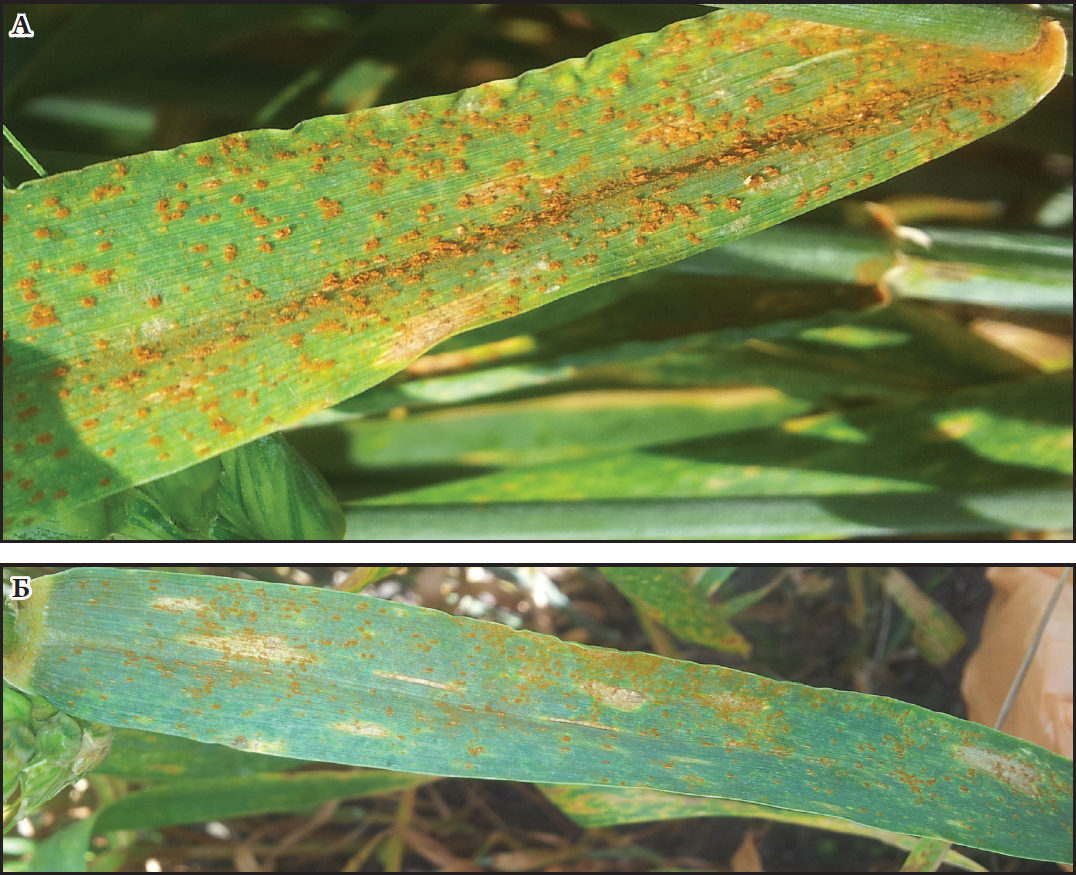The specifics of elicitor effect on Triticum aestivum macromorphogenesis under simultaneous lesion by Septoria tritici and Puccinia recondita
Abstract
Phytopathogenic fungi interrupt the macromorphogenesis of wheat (Triticum aestivum) but biotic elicitors stimulate the nonspecific tolerance, growth and development of plant stems. It is shown that oxalic acid as a biotic elicitor and donor of nitric oxide signal molecule (sodium nitroprusside) stimulate stem growth in height and last leaves length, as well as grain quantity and productivity both in cv. ‘Poliska 90’ and cv. ‘Stolychna’ under Septoria tritici and Puccinia recondita infection in field trials. It is detected that the degree of infected leaf area decreased in both treated cultivars under Saari-Prescott scale. Cv. ‘Poliska 90’ is more sensitive to both fungal pathogens than cv. ‘Stolychna’, but elicitor influence on its architectonics was no less than on cv. ‘Stolychna’.
References
[Babajants L.T., Meshterhazi A., Vexter F., Neklesa N., Dubinina L.A. 1988. Methods of selection and evaluation of wheat and barley tolerance to diseases in countries – Comecon members. Praga. (In Russian)]
Овруцька І.І. 2007. Уявлення про лігніфікацію клітинних стінок. Укр. ботан. журн. 64 (5): 720–729.
[Ovrutska I.I. 2007. The conception of cell walls lignification. Ukr. Bot. J. 64 (5): 720–729. (In Ukrainian)]
Тютерев С.Л. 2015. Экологически безопасные индукторы устойчивости растений к болезням и физиологическим стрессам. Вестник защиты растений 1 (83): 3–13.
[Tjuterev S.L. 2015. The ecologically safe inductors of plant tolerance to diseases and physiological stresses. Bull. Plant Protect. 1 (83): 3–13. (In Russian)]
Mittler R. 2002. Oxidative stress, antioxidants and stress tolerance. Trends Plant Sci. 7 (9): 405–410.
Kim K.S., Min J.-Y., Dickman M.B. 2008. Oxalic acid is an elicitor of plant programmed cell death during Sclerotinia sclerotiorum disease development. Mol. Plant-Microbe Interact. 21 (5): 605–612.
Soltis N.E., Kliebenstein D.J. 2015. Natural variation of plant metabolism: genetic mechanisms, interpretive caveats, and evolutionary and mechanistic insights. Plant Physiol. 169 (3): 1456–1468.
Van Breusegem F., Vranova E., Dat J.F., Inze D. 2001.The role of active oxygen species in plant signal transduction. Plant Sci. 161: 405–414.
Zhuk I.V., Lisova G.M., Dovgal Z.M., Dmitriev A.P. 2014. Induction of Triticum aestivum L. tolerance to Septoria tritici by oxalic acid. Mod. Phytomorphol. 6: 105–108.


This work is licensed under a Creative Commons Attribution-NonCommercial-NoDerivatives 4.0 International License.
The journal is licensed by Creative Commons under BY-NC-ND license. You are welcome and free to share (copy and redistribute the material in any medium or format) all the published materials. You may not use the material for commercial purposes. You must give appropriate credit to all published materials.
The journal allow the author(s) to hold the copyrights and to retain publishing rights without any restrictions. This is also indicated at the bottom of each article.





